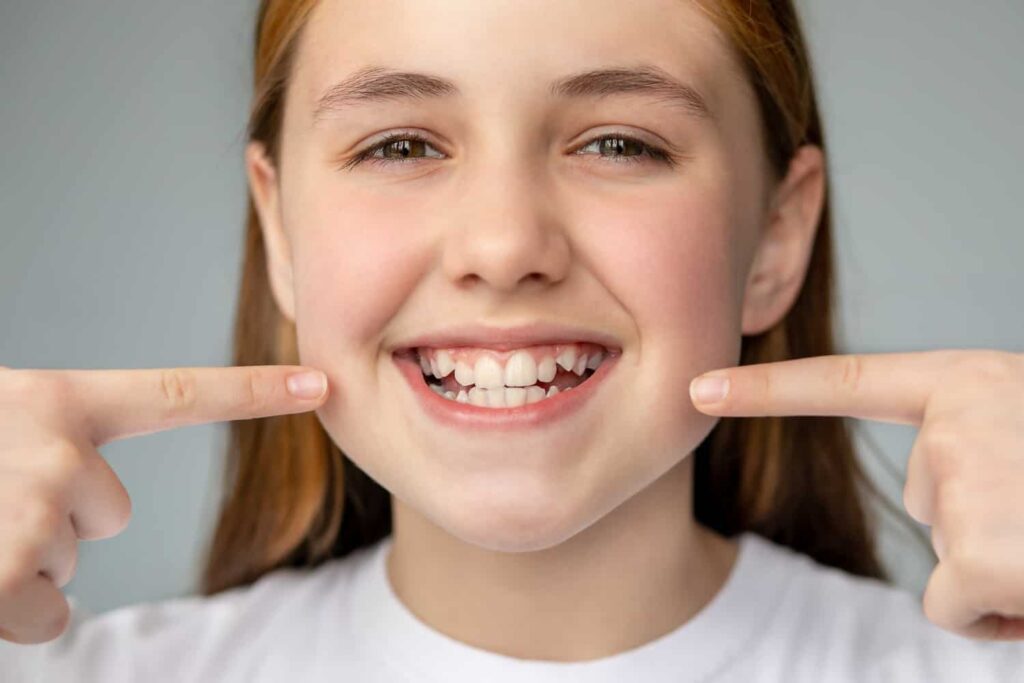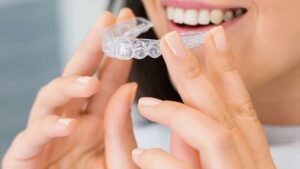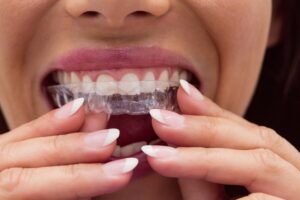Pacifiers, also known as soothers, binkies, or dummies, are a popular tool among parents to calm their babies. Silicone or plastic small nipples are most recommended in self comforting, especially to the infants. However, the overuse of pacifiers may affect the dental health of the child. In this blog, we’ll explore what pacifier teeth are, how to identify them, and the best ways to treat and prevent them.
What are Pacifier Teeth?
Pacifier teeth are a term used to describe dental problems that develop due to prolonged pacifier use or excessive thumb-sucking. These habits may lead to malocclusion to occur which means that the teeth get misaligned. Such misalignment distorts the proper alignment of the teeth resulting in numerous problems of the teeth.
The Root Cause of Pacifier Teeth
The primary cause of pacifier teeth is extended sucking on an object, whether it’s a pacifier or a thumb. The severity of the issue depends on how long and how intensely your child engages in these habits. Typically, the effects become noticeable between the ages of four and six, as this is when permanent teeth start to replace baby teeth.
Significance of Teeth for Babies Associated with the Use of Pacifiers
Pacifier teeth are the result of keeping an object too long in the mouth; whether it is a pacifier or the thumb. Of course, the severity of the issue is contingent on the duration, if it is left unaddressed, these issues can lead to more significant dental problems. Some potential consequences of prolonged pacifier use include:
Alterations in the Roof of the Mouth
Continuous sucking can change the shape of the mouth’s roof, leading to problems with biting and teeth alignment.
Crooked Front Teeth
Long-term pacifier use can cause the front teeth to become crooked, affecting your child’s smile and overall dental health.
Tongue Protrusion and Jaw Misalignment
This habit may also bring forward the portion of the tongue that protrudes out more than the normal, hence affecting the position of the jaw.
Bite Issues
Different types of bite problems can develop, such as crossbites, open bites, and underbites. These problems may interfere with your child’s ability to chew food and in alarming cases may have to see an orthodontist.
The Risk of Cavities
Cavities, or tooth decay, are another potential risk associated with pacifier use. Cavities are areas of permanent damage on a tooth, which can develop even in baby teeth. If not treated, cavities can lead to tooth loss. Often, cavities occur when parents dip pacifiers in sweet substances to encourage their children to use them. The sugar from these substances forms plaque around the teeth, leading to decay. If you notice or suspect cavities in your child’s mouth, it’s important to consult a dentist.
The Development of Buck Teeth
In some cases, the upper teeth may overlap with the lower teeth, a condition known as buck teeth. While this can be inherited, prolonged pacifier use and thumb-sucking can also contribute to the development of buck teeth.
The Problem of Overbites
An overbite is a type of malocclusion where the upper teeth significantly overlap the lower teeth. This condition can be made worse by prolonged pacifier use and is similar to an open bite, where the teeth are directed outward.

How to Fix Pacifier Teeth
If you think your child has pacifier teeth, it’s important to visit a dentist. A pediatric orthodontist may also be recommended to determine the best treatment plan.
Can Pacifier Teeth Correct Themselves?
There is a chance that pacifier teeth can correct themselves, but only if the problem is detected before your child turns two. Early intervention is crucial, and stopping the use of a pacifier at this stage can allow the teeth to realign naturally. However, once your child reaches the age of four, when permanent teeth begin to replace baby teeth, self-correction becomes less likely. In such cases, an orthodontist will need to determine the best treatment approach.
Braces: A Common Solution
Braces are a common treatment for various types of malocclusion caused by pacifier use. This orthodontic device can help correct crooked teeth, jaw misalignment, and bite problems. Braces are a versatile solution that can address a wide range of dental issues in children.
The Role of Palatal Expanders
A palatal expander is an oral device used to widen the upper jaw, helping to restore the natural alignment of the jaw and teeth. This device can also correct issues with the roof of the mouth. The length of time a palatal expander is needed varies depending on the severity of the misalignment and can range from a few months to several years.
When Surgery Is Necessary
In rare and severe cases, surgery may be required to fix the damage caused by pacifier teeth. Surgery is typically considered when one or more teeth need to be removed, which highlights the seriousness of pacifier teeth.
Thumb-Sucking vs. Pacifier: Which is Worse?
Both thumb-sucking and pacifier use can be harmful to your child’s dental health, especially if the habits continue beyond the age of four. Both can cause similar dental issues, including malocclusion and misalignment. However, thumb-sucking can be a more challenging habit to break, as it may last longer and is more likely to recur compared to pacifier use.
When Should Your Child Stop Using a Pacifier?
It’s generally recommended that children stop using pacifiers by the age of four to reduce the risk of developing pacifier teeth. Ideally, you should start weaning your child off the pacifier around 12 months. The exact timing depends on your child’s needs & your judgment as a parent. By addressing this habit early, you can help ensure that your child maintains a healthy, beautiful smile, free from issues like overbites, open bites, and buck teeth.
Conclusion
While pacifiers can be a helpful tool for soothing babies, it’s important to be aware of the potential dental issues that can arise from prolonged use. Pacifier teeth are a significant concern that can lead to various forms of malocclusion and other dental problems. By understanding the risks and addressing them early, you can help your child avoid these issues and maintain good oral health. If you suspect that your child may have pacifier teeth, consult with a dentist or orthodontist to explore the best treatment options.







